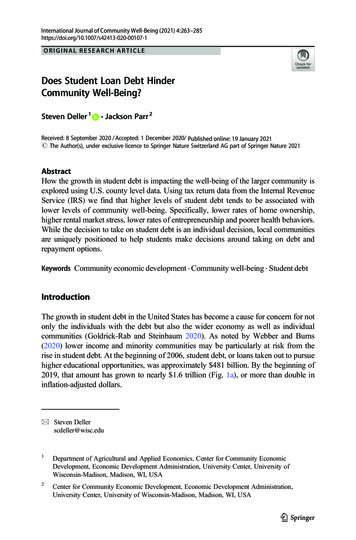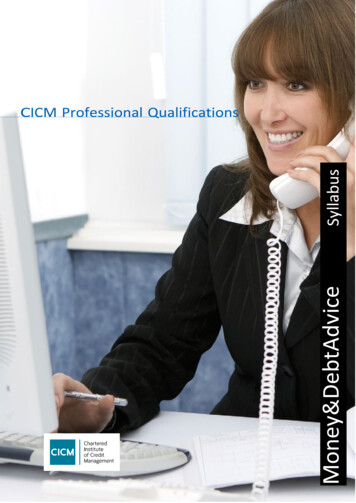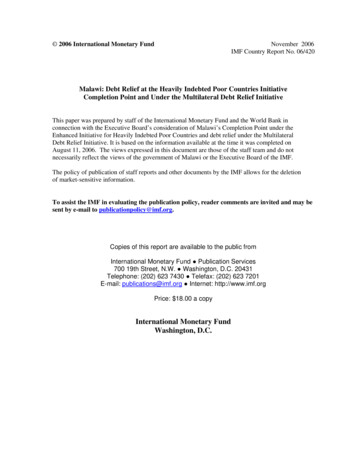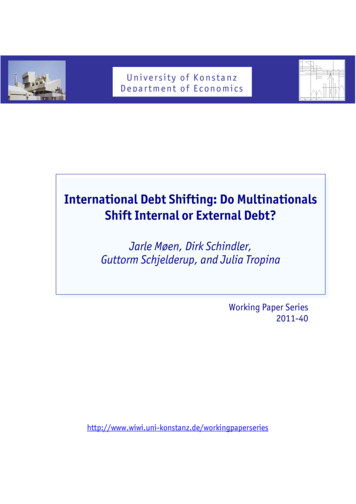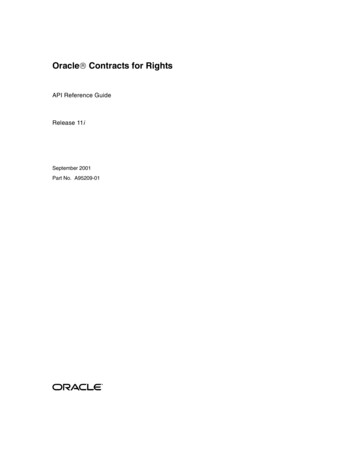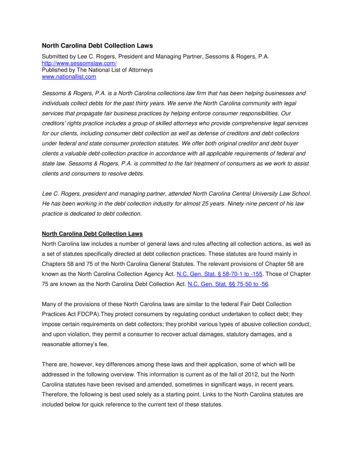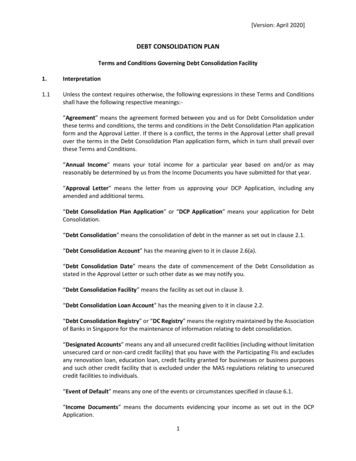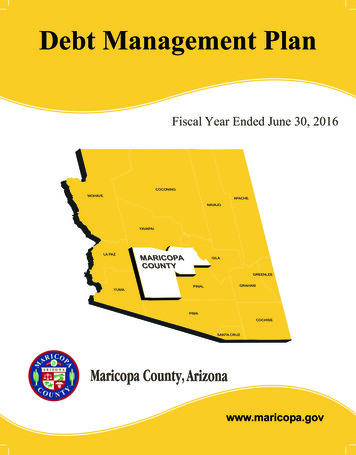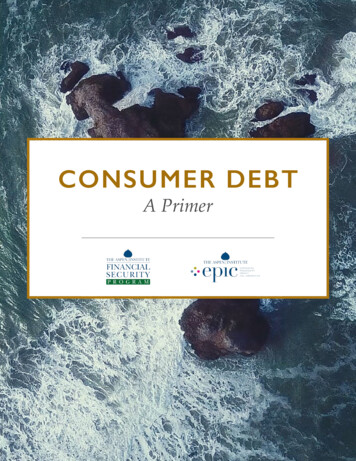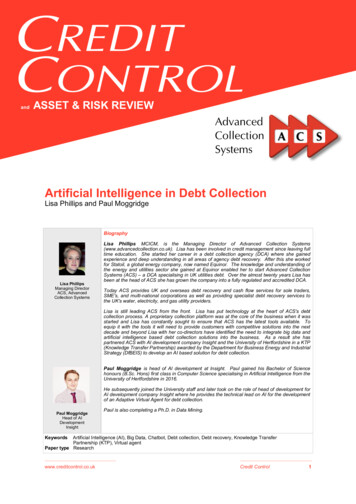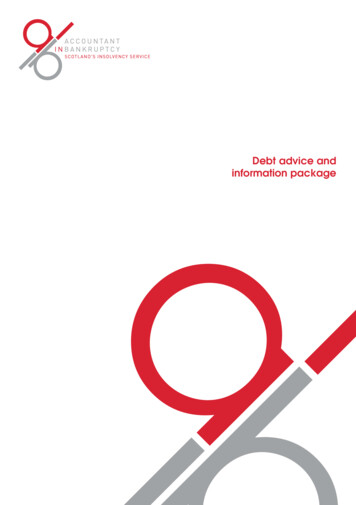
Transcription
Debt advice andinformation package
IMPORTANT – Do not ignore thisinformationYou can obtain more copies of this booklet,or copies of other booklets we produce, bycalling us on 0300 200 2600You can also find them on the publicationspage of our website: yThis publication is available on request incommunity language versions and alternativeformats. Please contact 0300 200 2600 forthis to be arranged.
DEBT ADVICE AND INFORMATION PACKAGEYou have been given this booklet because one ofthe following is happening or is about to happen: Someone that you owe money to is using a legalprocess to get back what you owe to them; or Someone that you owe money to intends to askthe court to make you bankrupt; or You have discussed entering a trust deed withan insolvency practitioner; or You have discussed the issue of a Certificatefor Sequestration with an authorised person.The law says information about where to obtain debtand money advice must be provided to you before furtheraction can be taken. This booklet contains importantinformation about getting advice to help you deal withyour creditors and your debt.3
Do not ignore this informationIgnoring your debts can lead to serious problems. You couldlose your possessions, including your home and savings, or bemade bankrupt. Getting money advice as soon as possible canhelp you to deal with your debts and your creditors and mayhelp you improve your situation.You are strongly advised to seek money advice.If someone has provided you with this booklet, action is beingtaken, or is about to be taken, against you.Who can give me help and advice?You can find free money advice in your area.There are a number of people who can give free, confidential,and impartial money advice face-to-face in your local area.Some organisations may also give information and adviceover the telephone or online.People who can give free, face-to-face advice includeadvisers at Citizens Advice Bureaux and Local Authoritymoney advisers.You can find a local, free money adviser by contacting:Money Advice Scotland07401074879 (text service e-with-moneyworriesYou can find your local Citizens Advice Bureau by contacting:Advice Direct Scotland0800 028 1456www.cas.org.uk4
Citizens Advice Scotland also offer advice online at:www.adviceguide.org.uk/ScotlandOther organisations that can give free advice include:StepChange Debt Charity0800 138 1111www.stepchange.orgNational Debtline Scotland0808 808 usiness Debtline0800 197 f you do not have access to the internet your local librarymay be able to provide online services for free.You can also obtain advice from insolvency practitionersalthough you should ask if they will charge for their initialadvice or for any other work they may do in connection withyour debts. The Institute of Chartered Accountants of Scotland(ICAS) on 0131 347 0100 or at www.icas.org.uk and theInsolvency Practitioners Association (IPA) on 020 7623 5108or at www.insolvency-practitioners.org.uk/ipsearch.aspx canhelp you find an insolvency practitioner in your area.You can also contact a solicitor, a financial adviser or a debtmanagement company, although they will probably chargeyou a fee. You may be entitled to legal aid to help with thecost of a solicitor.Whoever you ask for money or debt advice, make surethat the person you speak to knows you live in Scotland.5
What can they do for me?People who provide debt and money advice can look at yourpersonal situation, discuss the options available to you andhelp you decide which is the best course of action for you.You may also be given information on how to maximiseyour income or deal with emergencies. For example, theymay discuss whether you are entitled to benefits and whatyou can do if your bank account is frozen, if your gas orelectricity is cut off or if you are facing eviction.A money adviser can help you deal with your creditors.They may also help you with applications to court andrepresent you at court hearings.What can I do about my creditors and debts?Most importantly, do not ignore your creditors or your debts.If you take action as soon as possible there may be waysto improve your situation. Your options may include: Making informal arrangements with your creditors; Arranging for extra time to pay what you owe; Setting up a debt payment programme undera Debt Arrangement Scheme (DAS); Entering a trust deed; or Applying for your own bankruptcy.There is an application fee for this.A money adviser can help you decide what to do, give youadvice about all of the above options and tell you if thereare more options for you. They can also tell you about theconsequences of any of these options.6
The consequences of not dealing with your debtIf you have been provided with this booklet, one of thefollowing is happening or is about to happen:1. Someone that you owe money to is usingone of several legal processes called diligenceto get back what you oweIn Scotland, there are a number of legal processes that peopleyou owe money to (your creditors) can use to get back whatthey are owed. These processes are known as diligences andare usually carried out by sheriff officers on behalf of yourcreditors.These are some of the diligences that can be used: Your employer can be instructed to make deductions fromyour wages. This is known as arrestment of earnings. bank can be instructed to freeze funds in your bank Youraccounts and to release those funds to your creditor after14 weeks. This is known as arrestment. who has goods belonging to you can be Someoneinstructed to freeze them. The goods can later be removedand sold at auction. This is also known as arrestment. Your creditor can ask a sheriff officer to secure someitems in your possession. This is known as attachment.The items can later be taken away and sold at auction.Goods inside a dwellinghouse can only be attachedin exceptional circumstances. Sheriff officers can be instructed to take away moneyin your possession through money attachment. Yourcreditors can register an inhibition to prevent youdisposing of your home or other property that you own.When using most diligences, creditors are required by law toprovide you with this booklet.7
2. Someone that you owe money to intendsto ask the court to make you bankruptYour creditors can ask the court to make you bankrupt if youowe them at least 3,000. They must provide you with thisbooklet.In Scotland, sequestration is the legal word for bankruptcy.Bankruptcy has serious consequences. It will affect yourcredit rating and make it difficult for you to get credit infuture and can affect your employment or futureemployment. Your bank may freeze or close your bankaccounts. Bankruptcy can lead to the loss of your home,vehicles and other possessions.If you are made bankrupt, control of your assets (thingsyou own), such as your home, car, savings and other items,automatically passes to your trustee who may sell them topay your creditors. Your trustee is the person responsiblefor overseeing your bankruptcy.3. You have discussed entering a trust deed withan insolvency practitionerIf you sign a trust deed, you enter an agreement witha trustee who will administer the trust deed. You mustco-operate with your trustee. You agree that control of thethings you own, including your home, car, savings and otheritems passes to your trustee who may sell them to pay yourcreditors. You usually also agree to pay a regular amountfrom your wages or other income.8
If enough of your creditors agree to the terms of your trustdeed, it can become protected. As long as you keep to whatyou have agreed, your creditors are not allowed to takefurther action against you.Insolvency practitioners are required by law to provide youwith this booklet if you are about to set up a trust deed withthem. They must give you this booklet before you sign thetrust deed.4. You have discussed the issue of a Certificatefor Sequestration with an authorised personA Certificate for Sequestration certifies that you are unableto pay your debts as they become due. You can use thecertificate to support an application for your own bankruptcy.Authorised persons who can grant a certificate include mostmoney advisers, insolvency practitioners and some peoplewho work for insolvency practitioners.The authorised person must tell you about all the optionsavailable to you and must provide you with this bookletprior to granting you the Certificate for Sequestration.9
Further informationFurther information booklets are available for debtorsand creditors.A booklet called “Debt and the Consequences” gives you moreinformation about what can happen if you do not deal withyour debts or your creditors. It also tells you more about theoptions that might be available to you.You can find all of these booklets from Accountant inBankruptcy (AiB) online at www.aib.gov.uk. You can alsorequest a copy by e-mail at aib@aib.gov.uk or by telephoning0300 200 2600.AiB provides further information about bankruptcy, trustdeeds, the Debt Arrangement Scheme and the legal processesknown as diligences on their website at www.aib.gov.uk.10
Using your personal informationPersonal information which you supply to Accountantin Bankruptcy (AiB) may be used in a number of differentways to enable AiB to act in accordance with the Bankruptcy(Scotland) Act 2016 and other relevant legislation.For example: t o determine bankruptcy applications and Debt ArrangementScheme (DAS) debt payment programmes for the collection of fees and contributions to identify and sell assets t o supervise the administration of bankruptcies, protectedtrust deeds and debt payment programmes for statistical analysis purposesIn order to complete these statutory duties and tasks we doneed to collect and process personal information about youand sometimes about third parties. In certain circumstanceswe may share personal information with others, for example:our agents; banks; credit reference agencies; creditors andlocal authorities.If you are made bankrupt, sign a trust deed, apply fora DAS debt payment programme or register a moratorium,your details must be recorded in a public register whichis available for anyone to access free of charge. If you aremade subject to a Bankruptcy Restriction Order (BRO), detailsof your BRO will also be recorded on the AiB website.We, or an agent acting on our behalf may contact youto discuss your experience of using our services as partof our on-going commitment to improve customer service.If you do not wish us to contact you for this purpose,please let us know.11
Our full privacy statement details how we process personalinformation and your right to request to see, amend or deleteinformation which we hold about you, is published on ourwebsite: www.aib.gov.uk.If you wish a copy of our privacy statement you can writeto us at:Accountant in Bankruptcy1 Pennyburn RoadKilwinningAyrshireKA13 6SAYou can also email us at: gdpr@aib.gov.uk or phone us on0300 200 2600 and ask to speak with our Data ProtectionOfficer.Community language versions and alternative formats of ourprivacy statement are available on request. Please contact0300 200 2600 to ask for this to be arranged.12
0300 200 26000300 200 26000300 200 26000300 200 26000300 200 26000300 200 26000300 200 26000300 200 2600Aby otrzymać niniejszy dokument w innej wersji językowej, na kasecielub w wersji z powiększonym drukiem, prosimy o kontakt: 0300 200 2600This booklet is for general guidance only.It is not a detailed or full statement of the law.13
An agency ofDebt ArrangementSchemeAPS Group ScotlandSCT1116101094-002 (01/19)in03ilwning1ai 00A Pby2@ 0 rs enai 0h nb 2 ire yb.g 6uov 00 KA rn.u F 1 R3 okaw 030 6S dw 0 Aw.a 20ib 0.g 2ov 60.u 1kTK
Bankruptcy (AiB) online at www.aib.gov.uk. You can also request a copy by e-mail at aib@aib.gov.uk or by telephoning 0300 200 2600. AiB provides further information about bankruptcy, trust deeds, the Debt Arrangement Scheme and the legal processes known as diligences on their website at www.aib.gov.uk.
